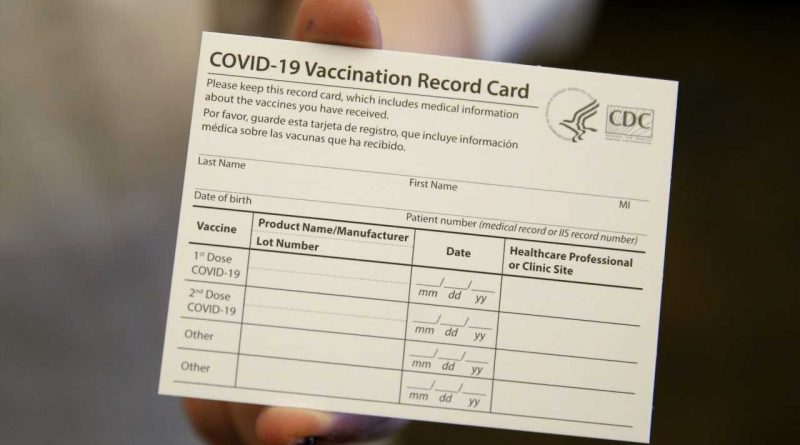What if you lose your vaccine card?
According to a Johns Hopkins University study, just over 16% of the U.S. population has been fully vaccinated against COVID-19. If you are one of the fortunate Americans to be vaccinated, you likely received a U.S. Centers for Disease Control and Prevention (CDC) card. This is the only way to confirm that someone has been vaccinated against COVID-19 in the United States right now.
It’s hard enough to simply get a COVID-19 vaccine in many states, so having to replace your vaccine card could pose a few problems.
But what happens if you do manage to lose your COVID-19 vaccine card? What are your options for getting a new card, especially when you might need it to travel or use a digital health passport?
Here’s what you need to know.
For more TPG news delivered each morning to your inbox, sign up for our daily newsletter.
What to do if you lose your vaccine card
Your COVID-19 vaccine card a small, unassuming piece of paper. If you aren’t careful, it’s possible that you could damage — or even lose — your card.
If that happens, don’t panic. All COVID-19 vaccination providers are required to report data within 72 hours in their state’s immunization system, meaning there will likely be a backup record of your vaccination status.
Although there is a record of your shot, you still may have to reach out to several sites to track it down.
The CDC says that you should first contact your vaccination provider — the location where you received the shot — to obtain your vaccination record if you have lost your vaccine card or didn’t receive one.
Recently, a friend who got vaccinated in Brooklyn accidentally got her card wet before receiving a second Pfizer vaccine dose. Workers at the facility happily exchanged it with a new card. So, depending on where you are in the vaccination process, you may be able to quickly get a new card, too.
Another option is to contact your state’s immunization information system (IIS) to see if it has the records. You can also try your state’s health department.
And also note that you have these options with all vaccines — not just the COVID-19 shots.
Finally, if you enrolled in the CDC’s v-safe or VaxText text notification system, you can access your vaccination information that way (however, don’t contact the CDC directly as they do not have a vaccination database).
Related: 3 things to know about your CDC vaccine card
Your vaccine card may come in handy soon
Destinations may soon require proof of a COVID-19 vaccination, and streamlining that process is something the travel industry has been working on in the form of digital vaccine passports. Your CDC COVID-19 vaccine card may become your ticket out of strict (and possibly expensive) testing and quarantine requirements.
A digital health passport will host verified test and vaccine information, and several have already had trial runs on a number of airlines. These health passes are expected to be optional but will be vital to the travel experience moving forward.
Digital health passports, such as IATA Travel Pass and Clear Health Pass, will host verified test and vaccine information. Several health passport providers have previously told TPG that getting your vaccine status or negative test results onto their apps will be easy.
“You would take a picture, which would, in this case, be a CDC vaccination card with your name on it,” Nick Careen, IATA’s senior vice president of airport, passenger, cargo and security, told TPG last month.
And because there are real concerns that some people would fake negative coronavirus results or COVID-19 vaccine status, providers have indicated that they’re looking for ways to verify the information.
Related: Your guide to digital health passports
Keep your vaccine card safe
Health experts say you should treat your vaccine card like you would an important document, credit card or your driver’s license.
It would be best if you stored it in a secure location like a safe or a desk drawer at all times. If you plan to keep it in a wallet, make sure it doesn’t get damp or bent. It’s unclear whether you should laminate your card (we’ve reached out to the CDC for clarification), but you could keep it in a clear name badge holder.
There will likely be a backup record of your vaccination status if you lose your card, but employing a few best practices when you get it could mitigate needing a new one down the line.
Related: You finally got vaccinated: Here’s what you’ll need for a digital health passport
Bottom line
It can be hard enough to simply get vaccinated against COVID-19, so you’ll want to safeguard your vaccine card as soon as you get inoculated.
It is possible some travelers may inadvertently lose or damage their cards. Take preventative measures in case this happens to you: Snap a photo of your vaccine card, make a note of the facility you got vaccinated at and register with the CDC text notification systems so you’ll be prepared to reach out to the correct sources in case your card gets damaged or lost.
Featured photo by Jessica Rinaldi/The Boston Globe via Getty Images
SPONSORED: With states reopening, enjoying a meal from a restaurant no longer just means curbside pickup.
And when you do spend on dining, you should use a credit card that will maximize your rewards and potentially even score special discounts. Thanks to temporary card bonuses and changes due to coronavirus, you may even be able to score a meal at your favorite restaurant for free.
These are the best credit cards for dining out, taking out, and ordering in to maximize every meal purchase.
—
Editorial Disclaimer: Opinions expressed here are the author’s alone, not those of any bank, credit card issuer, airlines or hotel chain, and have not been reviewed, approved or otherwise endorsed by any of these entities.
Source: Read Full Article



